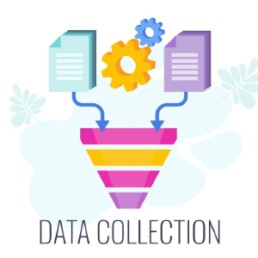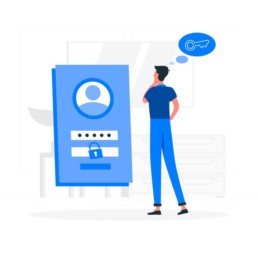Data Collection
¿What is Data Collection, why is it important?
Data collection is the process of recording information, using different methods, according to the type of service provided. By using data collection and analysis methods, it is easier for professionals to measure and report accurate and real data in order to make the right decisions in determining what will be the most effective way to modify or improve the quality of the services they provide.
There are several types of data collection. For example, in the case of some therapies such as ABA, an analyst will determine what kind of data to collect depending on the type of information he or she needs about the behavior or response being evaluated.
Office Puzzle provides you with a detailed data collection system, fast and easy to handle. With several ways to add, organize, visualize and analyze with care and precision your client's data. Making the difficult and tedious work of adding handwritten information disappear.
Our system has implemented more than 15 data collection methods, on which we have worked to perfect it for your benefit, that you can employ regardless of the therapy you are using for your client.
| Type | Description | Methods |
| Event Recording | The number of occurrences by a unit of time. Ex: hour, day, week, interval. | Frequency, Count, Rate |
| Time Sampling | Collect data at periodic points in time or time periods rather than on a consistent basis. | Whole Interval, Partial Interval, Momentary Time Sampling |
| Timing | Length of time the behavior, or event occurred. | Duration, Response Latency, Interresponse Time |
| Trial | Several ways to easily record whether a response has been Correct, Incorrect, or there was no response to the test applied. | Discrete Trial Teaching, Incident Teaching, Percentage of Opportunities |
| Task analysis | Task analysis is used to break complex tasks into a sequence of smaller steps or actions. | Forward Chaining, Backward Chaining, Total Task Chaining, Backward Chaining with Leaps Ahead |
Data collected in the system is linked directly to the graph to be able to follow the progress of your client.
We mostly offer two ways of collecting data, click on each one of the methods below to learn more about it.
As a team, we are confident that collecting your client's data from our software will definitely make your work easier. If you need more information, just email us at hello@officepuzzle.com.
Live Chat Support

Previously, getting in touch with support was only available in its most basic forms: calling a phone number for assistance or physically going to the company's shop. Today, we are in an age where raising concerns is at our very fingertips.
Support is a way for customers to get help either through instant messaging platforms, email, or toll-free telephone services. Integrated support applications allow agents or administrators to respond to text chats from the many customers using the website. It allows a company to engage visitors to the system, both reactively and proactively, with the anticipation of increased interactivity and trust with website visitors.
Our support team is just as important as the other teams because they are one of the direct connections between users and our system. We strive to deliver first-class customer service, which means combining some of our main qualities: quick resolutions, helpful and empathetic agents, and commitment to the issues that matter to our clients.
![]()
You can reach us through your preferred channels: live chat from Monday to Friday, from 9:00 am to 5:00 pm (EST), as well as through our email support@officepuzzle.com.
Custom Templates
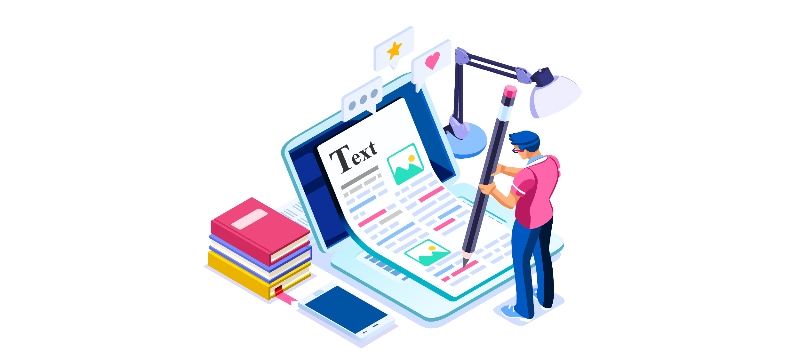
A custom template is created from a previously established model, trying as much as possible to keep the formatting, fonts, margins, and styles. It applies to forms, documents, tables, or any other type of document.
Advantages
Easy transition
By keeping the same formatting used on paper, any user can easily transition without having to stop and think about how the document is completed.
Standardization
As documents are automatically generated by the system, it is guaranteed that they all keep the same format, avoiding errors in fields that need to be updated such as dates, names, addresses, etc. It also ensures that all documents are generated with the latest version approved by the organization.
Autocompletion
Many fields can extract dynamic information specific to the client in question without the manual insertion by the user, saving document creation time.
Availability
As they are digital documents, access to them is guaranteed whenever needed.
Security
Being stored in the cloud and encrypted, all access is controlled and limited to authorized personnel.
Office Puzzle supports custom templates and offers a variety of pre-designed documents. If you need more information, just email us at hello@officepuzzle.com.
Save user signature

Name: Save user signature
Description: How to save the signature of a User
Difficulty: Easy
Duration: Less than 1 minute
Summary:
1. Access your profile.
2. Click on the Manage button.
3. Click on the Signature tab.
4. Click on the New signature.
5. Draw the new signature inside the box.
6. Click on the green button Sign.
How to save my signature
Step 1: Access your profile.
 or
or 
Step 2: Click on the Manage button.
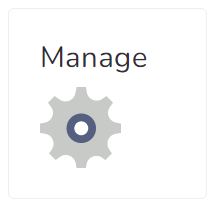
Step 3: Click on the Signature tab.
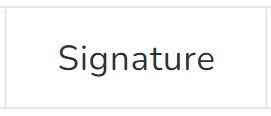
Step 4: Click on the New signature.

Step 5: Draw the new signature inside the box.

Step 6: Click on the green button Sign.

Office Puzzle's User Access Roles

How does role-based access control work?
It is a security mechanism that restricts unauthorized access to the system. Each user has a specific role, which determines the privileges they are granted.
The user can be controlled when he/she performs a certain action within the system, and only be granted access to the information required for performing the task as specified in the configured role. As a result, managing permissions is minimized because users do not have to create permissions one by one, once roles with specific permissions have been created. Then, they can assign users according to their needs. This ensures that information is protected from malicious users by preventing them from accessing information not relevant to them.
Using Office Puzzle's built-in role-based access control, you can control the actions that are performed on every page within the system, such as create, read, edit and delete. According to their role, these actions are authorized or not, avoiding unexpected changes and protecting information.
The PROVIDER roles in the system are as follows:
PROVIDER_LEVEL_1: Accesses all customer information, creates documents, events, uploads files and collects data.
PROVIDER_LEVEL_2: Same as PROVIDER_LEVEL_1 with the additional ability to modify the service plan and review documents from other providers to mark them as read-only.
PROVIDER_ADMIN: Same as PROVIDER_LEVEL_2, but additionally can modify all customer information such as demographics, addresses, authorizations, required documents, etc.
The ADMIN roles in the system are as follows:
ADMIN: Has full access to the agency, users, and clients.
ADMIN_HR: Accesses all agency-level information related to human resources, like Management of in-services, Payroll, New users, etc. Has limited access to clients, but full access to providers.
ADMIN_CLINICAL: Accesses to manage all agency-level information related to the clinical side. Limited access to users but full access to the clients.
ADMIN_OPERATIONS: Accesses agency-level information, like Users, Calendar, Reports, Documents etc. Has limited access to agency, but full access to providers and clients.
ADMIN_BILLING: Accesses claims at agency level. Has limited access to agency, but full access to Billing.
ADMIN_READONLY: Accesses the agency, users, and clients, but without creating, editing or deleting anything.
Reset Password
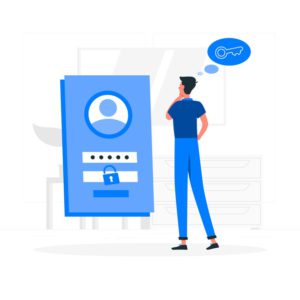
Name: Reset password
Description: How to reset the password for your account over Office Puzzle
Difficulty: Easy
Duration: Less than 1 minute
Summary:
1. Navigate to your login URL (Example: demo.officepuzzle.com)
2. Click Reset Password
3. Enter your email address and click Continue
4. Check your email and click on the link
5. Enter the new password
How to Reset my password
Step1: Navigate to your login URL (Example: XXXX.officepuzzle.com).
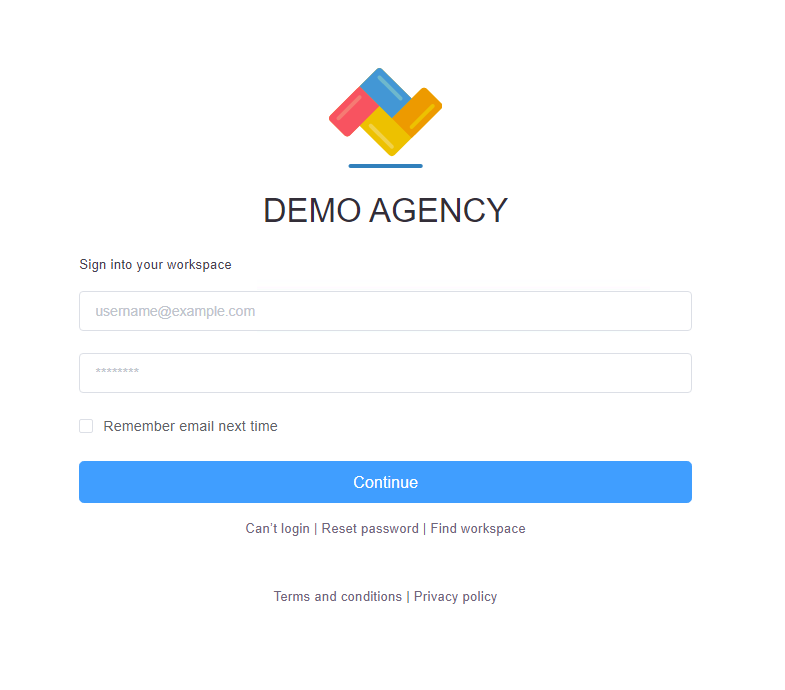
Step 2: Click on Reset Password (below the continue button).
Step 3: Enter your email address and click continue.
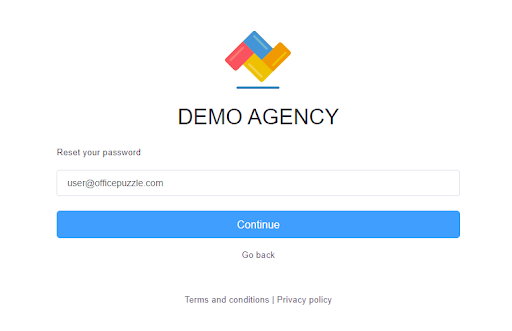
Step 4: Check your email for the subject line: Password reset for DEMO AGENCY, and click on the link.
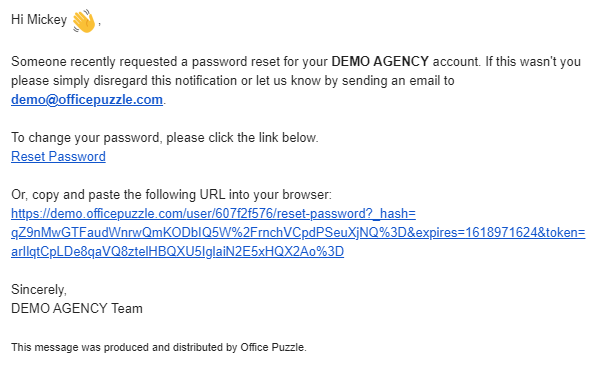
Step 5: Enter your new password in both fields and hit Continue.
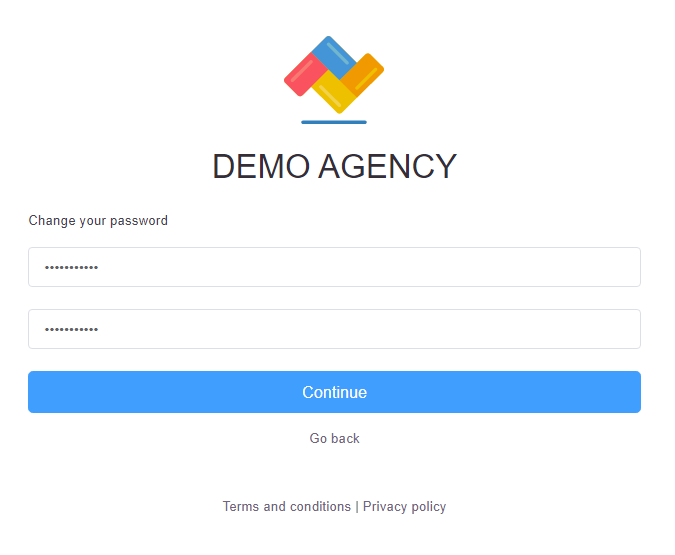
If everything is ok with your account, you should receive a new email confirming the password change.
You can always contact us via the chat button in the bottom right corner of your login page.
https://www.youtube.com/watch?v=Wf7rurx_L3M


